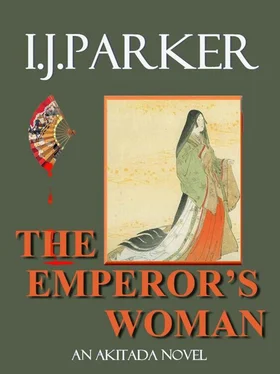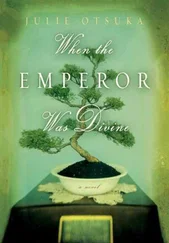I. Parker - The Emperor's woman
Здесь есть возможность читать онлайн «I. Parker - The Emperor's woman» весь текст электронной книги совершенно бесплатно (целиком полную версию без сокращений). В некоторых случаях можно слушать аудио, скачать через торрент в формате fb2 и присутствует краткое содержание. Жанр: Исторический детектив, на английском языке. Описание произведения, (предисловие) а так же отзывы посетителей доступны на портале библиотеки ЛибКат.
- Название:The Emperor's woman
- Автор:
- Жанр:
- Год:неизвестен
- ISBN:нет данных
- Рейтинг книги:5 / 5. Голосов: 1
-
Избранное:Добавить в избранное
- Отзывы:
-
Ваша оценка:
- 100
- 1
- 2
- 3
- 4
- 5
The Emperor's woman: краткое содержание, описание и аннотация
Предлагаем к чтению аннотацию, описание, краткое содержание или предисловие (зависит от того, что написал сам автор книги «The Emperor's woman»). Если вы не нашли необходимую информацию о книге — напишите в комментариях, мы постараемся отыскать её.
The Emperor's woman — читать онлайн бесплатно полную книгу (весь текст) целиком
Ниже представлен текст книги, разбитый по страницам. Система сохранения места последней прочитанной страницы, позволяет с удобством читать онлайн бесплатно книгу «The Emperor's woman», без необходимости каждый раз заново искать на чём Вы остановились. Поставьте закладку, и сможете в любой момент перейти на страницу, на которой закончили чтение.
Интервал:
Закладка:
“Well…” Genba looked to Tora for help.
“Genba thinks it will be best if he visits her in the city.” Tora was clearly uncomfortable.
“Oh.” Akitada looked from one to the other and frowned.
Tora bit his lip. “We thought you wouldn’t want another woman from the amusement quarter under your roof.”
“What nonsense! Another woman? You mean Hanae?” Tora nodded, and Akitada snapped, “You were wrong. Hanae is part of my family, as are both of you. You are like brothers to me. How could I deny either of you the joy of raising a family? My fortunes aren’t great and my future isn’t promising either, but if you’ll settle for what we can offer, Genba, and if you wish to take a wife, I will welcome her and your future children into my house. The same goes for Saburo. If I have given you a different impression in the past, I’m sorry. I tend to worry about the company you keep, but you’re both grown men, and I have no right to interfere in your lives as long as you respect my family.”
They both gaped at him.
When nobody said anything, Akitada smiled. “Are you happy here, Genba?”
“Yes, sir, but… are you sure? Ohiro… I love her dearly and she’s a sweet and good woman, sir, but she did work in a brothel. Hanae never did.”
“I’ve learned a few things lately about how young women end up in places they shouldn’t be, sold by their parents to men who mistreat them. Ohiro’s not to blame for what her life was like in the past, as long as she will be a devoted wife to you.” Seeing Tears well up in Genba’s eyes again, Akitada added quickly, “And now you two had better go and see about living quarters for Genba and his bride.”
They left grinning, with Genba muttering his thanks over and over again.
Having thus arranged his household to his entire satisfaction, Akitada stepped out on his veranda and stretched. The garden was peaceful in the afternoon sun. Sighing with pleasure, he drew Lady Masako’s journal from his sleeve and went back inside.
It was tastefully bound in pale green brocade with a pattern of golden shells and white cherry blossoms. He undid the darker green silk ribbon and opened it. The paper was of the finest quality, and the lady’s brush strokes proved she had a good education. The journal was short and tended to skip days.
He settled down at his desk and started reading.
The entries were dated by the year and month, and it appeared she had started the diary soon after she had entered the palace. As was customary, she referred to herself in the third person and never by name. This device made the diary read like a tale about an imaginary character and was, no doubt, meant to protect the author’s identity.
It occurred to Akitada that he had no proof this was Lady Masako’s journal except for Lady Hiroko’s word. He would have to read the entries carefully, looking for internal evidence of the author’s identity.
The first pages described the season-it was spring, and the writer grieved at not seeing the cherry blossoms of her former home-but soon she mentioned incidents: visits from a father, then from a brother, court festivities, seasonal observations, more parental visits. Interjected poems began to suggest first melancholy, and then sadness: “Alas, each day brought deeper grief; each week another lament,” and “In sorrow her days passed without comfort.”
After the initial introduction to His Majesty, which dwelled in detail on the lady’s gowns, there were no more references to the emperor. To Akitada this implied that her hurt at being rejected by the young monarch was too great to allow her to make the slightest reference to Him.
Akitada had progressed this far, when quick steps approached. Then the door opened, admitting Akiko and his wife. The ladies were wide-eyed with curiosity.
“There you are,” said Akiko. “And you’re reading it. Why didn’t you wait for us?”
Akitada frowned. “I intend to absorb the contents in peace and quiet. I can’t think when women chatter in my ears.”
Akiko hissed. “Shameful! When I was the one who got the journal for you. You are the most ungrateful creature.”
Tamako smiled and came to sit across from him. “You look tired, Akitada. I had the water heated for your bath. It will soothe your aches and pains.”
He looked at her gratefully. “Thank you. I’ll bathe as soon as I’ve had a look at this.”
“What about us?” demanded his sister. “You cannot keep it to yourself.”
Tamako said, “She has a point, Akitada.”
Akiko sat down beside her, her chin in the air. “I’m not leaving until I’ve read the journal.”
Akitada sighed. “Very well. I’ll read it out loud. But don’t interrupt constantly.”
The ladies smiled triumphantly and settled themselves comfortably on their cushions. Akitada turned to the beginning and started reading. They listened, sometimes exchanging glances and nods, but remained quiet. It was not until he was well past the middle of the diary and had reached a passage where a page arrived and passed a branch of flowering orange to the lady that his sister spoke.
“A note from Prince Tametaka? Who is that? There is no Prince Tametaka.”
Akitada gave her a reproving look. “She probably means Atsuhira; she’s hiding his true identity.”
“Oh! How fascinating!” Akiko clapped her hands.
Akitada ignored this and continued. It seemed to him Atsuhira had pursued Masako rather early in her career at court, but he said nothing of this.
The writer passed over the incident of the flowering orange branch or the note attached to it, only composing the conventional poem in response. However, the poem was certainly suggestive: “The scent of orange flowers is welcome to one whose sleeves lack such perfume.”
The ladies gasped. Akiko said, “That’s an invitation.”
Tamako merely looked shocked.
Akitada was beginning to enter into Lady Masako’s frame of mind. The rejected young woman wrote of her loneliness. No wonder she longed for love.
The affair began soon after. The prince called on her and spoke to her through the lowered reed curtains. His poems suggested they make their dream a reality. She responded, “I dream sweet dreams; my sleeves are wet with tears. If I take the dark path alone, we will meet in paradise.”
A few nights later, he slipped into her room, and they became lovers. He marked the occasion with a poem on the meeting of their souls. She told him, “The cuckoo’s song was full of pain; now it is summer and he sings with full-throated joy.”
He paused. Had Lady Hiroko known of the forbidden meeting inside the palace? More than likely. And summer would soon be over.
Akiko sniffed. “Hurry on. We still have nothing to point to murder.”
Entries followed about more shared nights and exchanged poems. The meetings in the palace were deemed too dangerous, and the lady arranged outings so she could meet him in his villa. He talked of marriage. She worried about scandal. And still the time spent in the imperial palace hung heavy on her hands. She had no friends except Lady Hiroko, who appeared in the journal now and then as Lady Sakyo. Her father stopped his frequent visits but sent angry letters. At some point, he demanded she return home. She obeyed, but the journal contained nothing about the visit. It picked back up late in autumn, when she was back in the palace.
At this point the tone changed. She had made up her mind to leave her service to the emperor in order to live with the prince. However, there appeared to be difficulties. Lady Masako did not specify what they were, but they seemed to have to do with the prince’s household.
Having got this far, Akitada paused again. “My throat is dry. Let’s have some wine.”
Читать дальшеИнтервал:
Закладка:
Похожие книги на «The Emperor's woman»
Представляем Вашему вниманию похожие книги на «The Emperor's woman» списком для выбора. Мы отобрали схожую по названию и смыслу литературу в надежде предоставить читателям больше вариантов отыскать новые, интересные, ещё непрочитанные произведения.
Обсуждение, отзывы о книге «The Emperor's woman» и просто собственные мнения читателей. Оставьте ваши комментарии, напишите, что Вы думаете о произведении, его смысле или главных героях. Укажите что конкретно понравилось, а что нет, и почему Вы так считаете.












